Men of the Cloth and the Book: E.J. Pratt and Lorne Pierce
Cheryl Cundell, Queen’s University
Newfoundland-born E. J. (Edwin John) Pratt (1882-1964) was considered 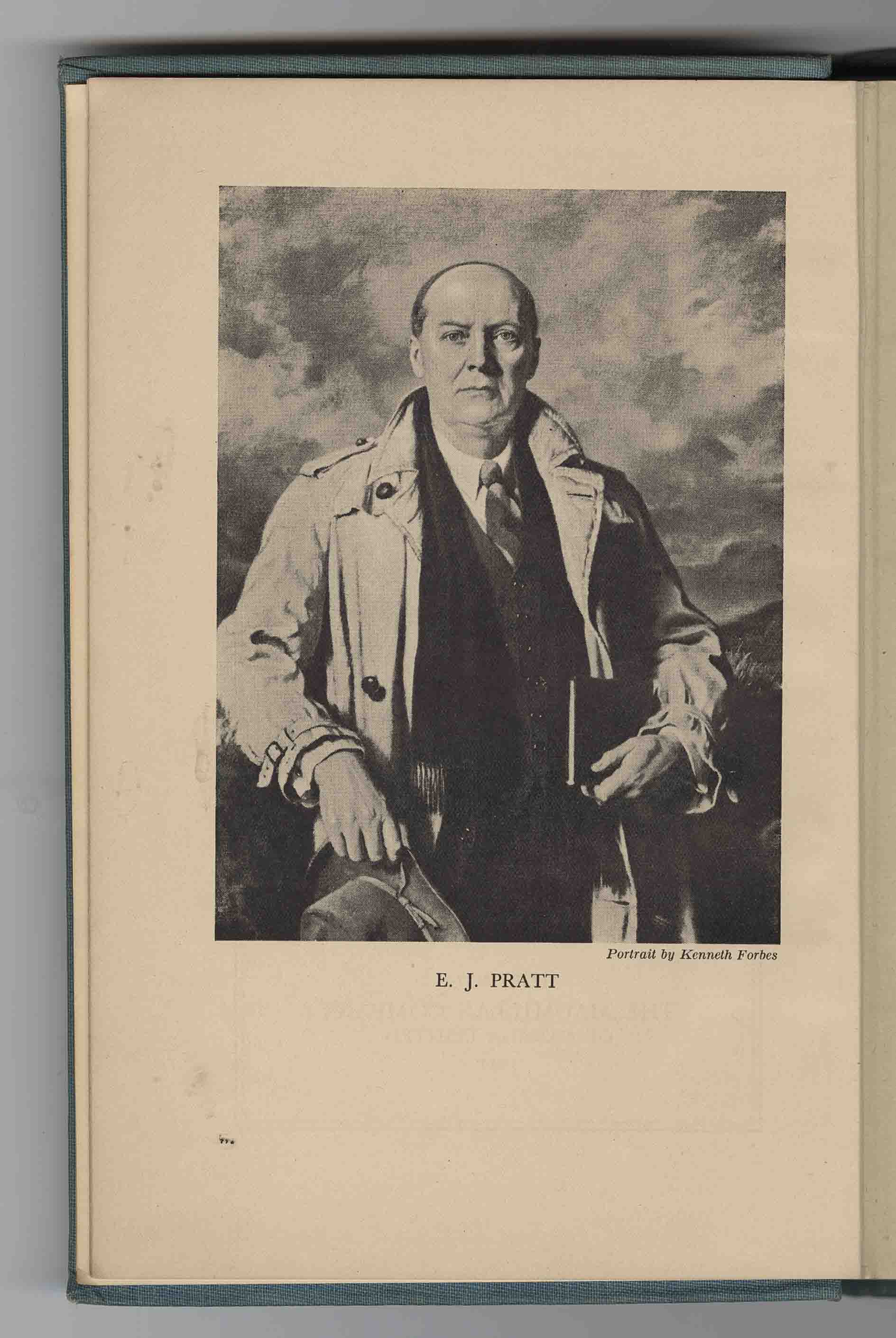 Canada’s national poet even before his native province joined Canada in 1949. Understood variously as a poetic innovator who employed the language and ideas of science, a bridge between Canadian romanticism and modernism, and the first representative of an authentic Canadian poetry, Pratt wrote poems that are as much products of the concerns of his time as they are of the influences and experiences of his Newfoundland childhood and youth. Two recurring themes in Pratt’s work are the ocean and evolution. Employing various forms—ballad, documentary, ode, sonnet—Pratt offers a vision that is grand, often tragic, and at times tinted with shades of irony. His style ranges from formal to colloquial and from imagistic to expansive. Difficult to categorise, his work is distinguished.
Canada’s national poet even before his native province joined Canada in 1949. Understood variously as a poetic innovator who employed the language and ideas of science, a bridge between Canadian romanticism and modernism, and the first representative of an authentic Canadian poetry, Pratt wrote poems that are as much products of the concerns of his time as they are of the influences and experiences of his Newfoundland childhood and youth. Two recurring themes in Pratt’s work are the ocean and evolution. Employing various forms—ballad, documentary, ode, sonnet—Pratt offers a vision that is grand, often tragic, and at times tinted with shades of irony. His style ranges from formal to colloquial and from imagistic to expansive. Difficult to categorise, his work is distinguished.
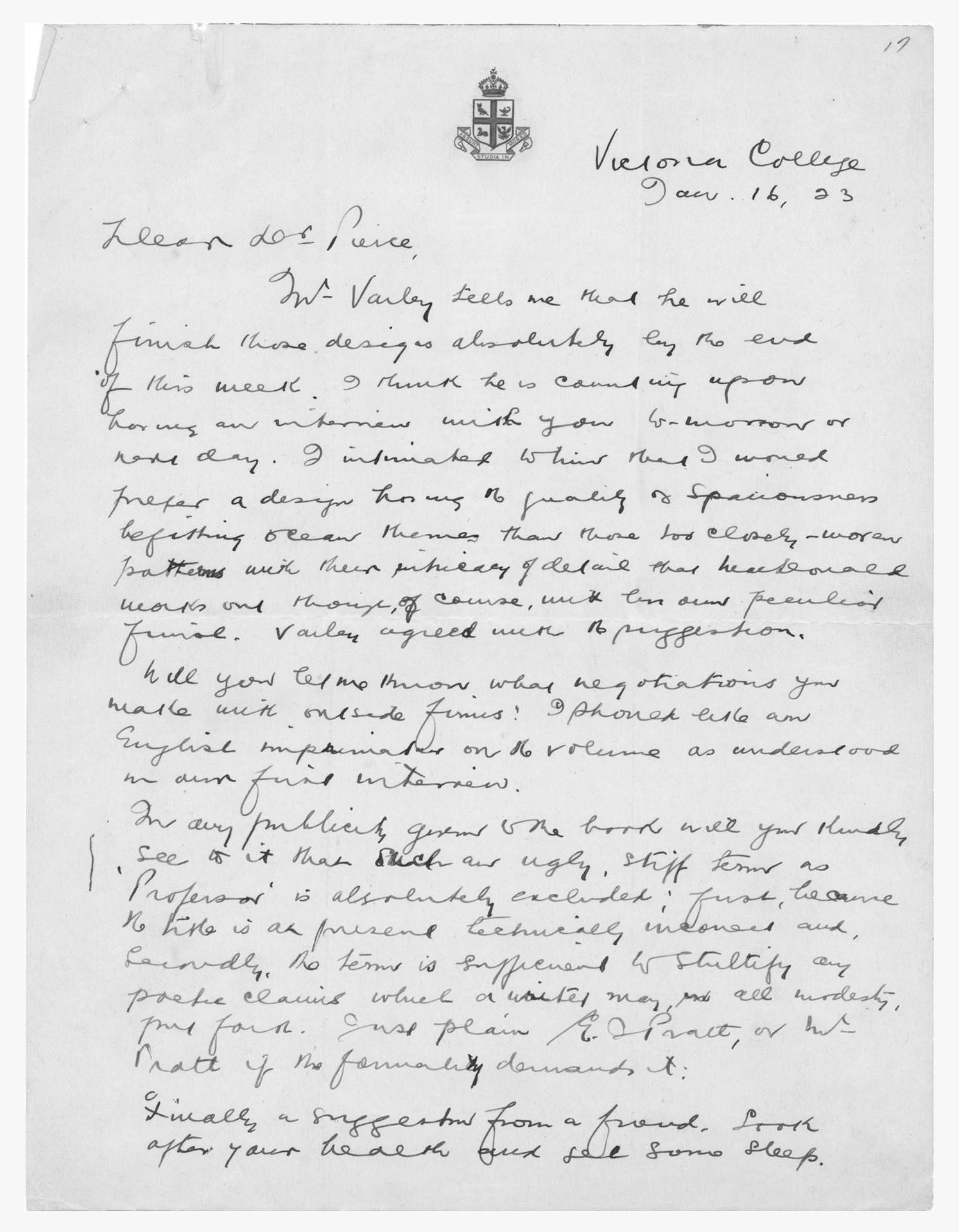 A number of Pratt’s earliest poetic experiments were published in the University of Toronto’s Victoria College student periodical, Acta Victoriana, between 1909 and 1920. An ordained Methodist minister, Pratt published his doctoral thesis (Studies in Pauline Eschatology and Its Background) with the Ryerson Press in 1917, the same year in which his first book of poetry, Rachel: A Sea Story of Newfoundland in Verse, was privately printed in New York. His poetic career did not, however, begin in earnest until he renewed his relationship with Ryerson, thanks to a recommendation made to its editor, Lorne Pierce. In 1922, Pierce included Pratt’s work in the anthology Our Canadian Literature: Representative Prose and Verse. The following year, Ryerson published Pratt’s Newfoundland Verse (1923), with decorations by Group of Seven member
A number of Pratt’s earliest poetic experiments were published in the University of Toronto’s Victoria College student periodical, Acta Victoriana, between 1909 and 1920. An ordained Methodist minister, Pratt published his doctoral thesis (Studies in Pauline Eschatology and Its Background) with the Ryerson Press in 1917, the same year in which his first book of poetry, Rachel: A Sea Story of Newfoundland in Verse, was privately printed in New York. His poetic career did not, however, begin in earnest until he renewed his relationship with Ryerson, thanks to a recommendation made to its editor, Lorne Pierce. In 1922, Pierce included Pratt’s work in the anthology Our Canadian Literature: Representative Prose and Verse. The following year, Ryerson published Pratt’s Newfoundland Verse (1923), with decorations by Group of Seven member  Frederick H. Varley.
Frederick H. Varley.
From the initial introduction, a lively, life-long correspondence between editor and poet ensued. Pierce was also an ordained Methodist minister, and the early correspondence between the two men reveals their common experience through playful, religious allusions and language. In a letter concerning the contract for Newfoundland Verse, Pierce exhorted Pratt to visit, saying, “we will barricade both ends of the street so that neither Deaconist nor Evangelist can get through,” and closed the letter with an irreverent, “Yours reverently.” In 1932, Pierce had to seek permission to dispose of the remaining 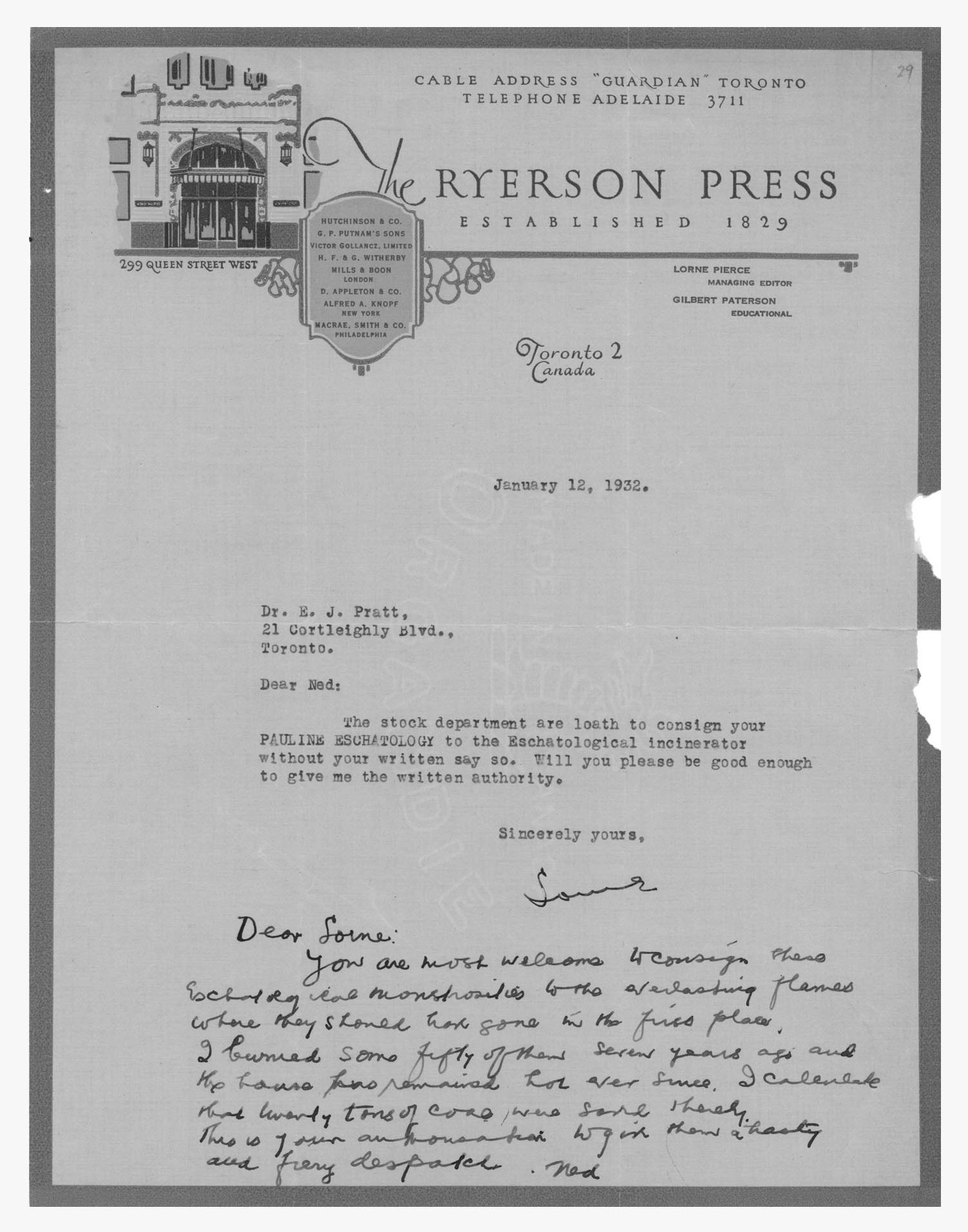 copies of Pratt’s doctoral thesis. Inscribed at the bottom of the request, Pratt’s permission recalls the playfulness of their earlier exchanges: “You are most welcome to consign these Eschatological monstrosities to the everlasting flames where they should have gone in the first place.”
copies of Pratt’s doctoral thesis. Inscribed at the bottom of the request, Pratt’s permission recalls the playfulness of their earlier exchanges: “You are most welcome to consign these Eschatological monstrosities to the everlasting flames where they should have gone in the first place.”
Gaining recognition in the 1920s and 1930s, Pratt not only published his own poems in periodicals such as The Canadian Forum, Canadian Bookman, and Queen’s Quarterly, he also had a role in publishing other poets when he became editor of the Canadian Authors Association’s newly-created 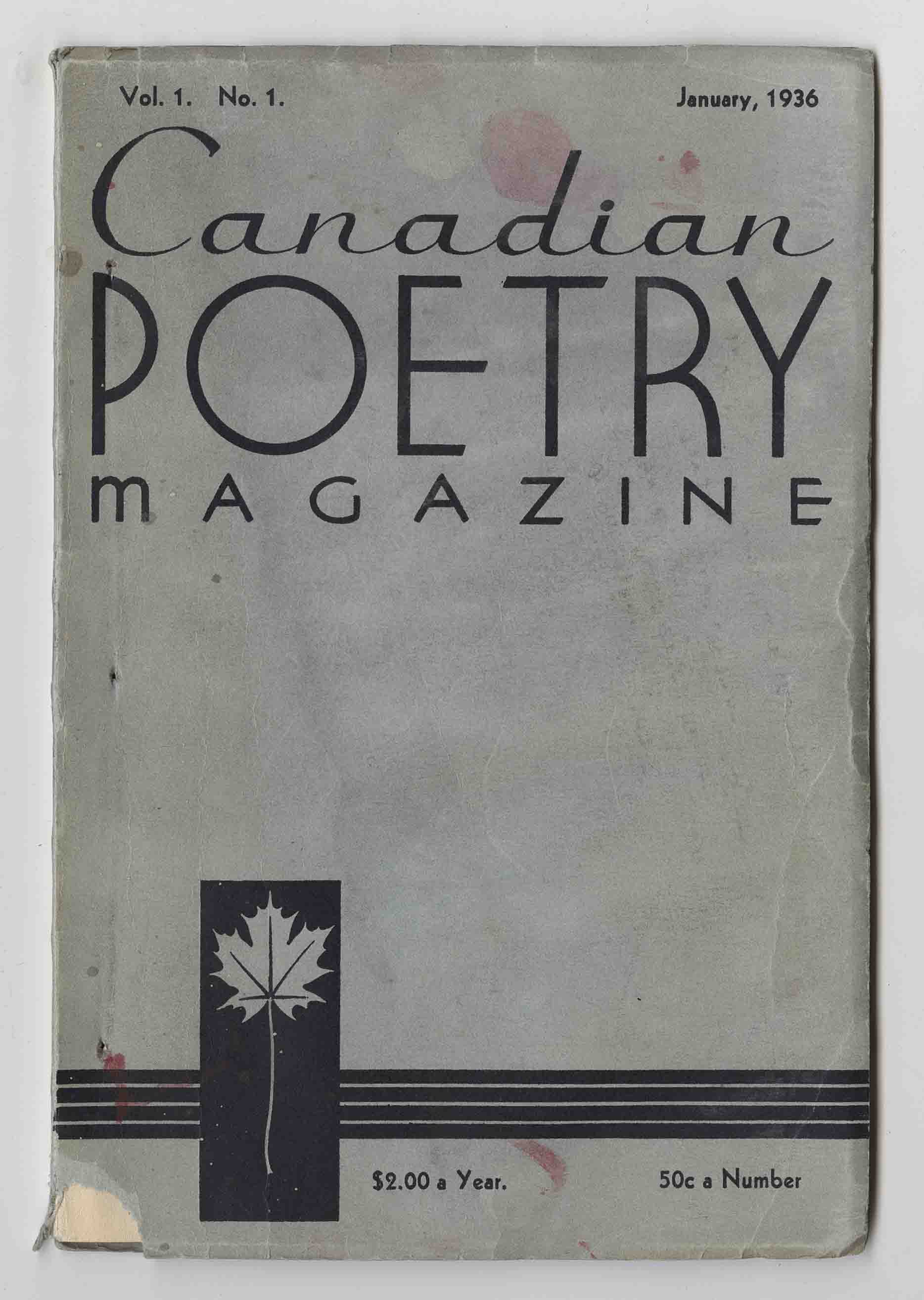 Canadian Poetry Magazine in 1936. The following year he won his first Governor General’s Award for The Fable of the Goats and Other Poems (1937). Two more Governor General’s Awards followed, for his documentary long poems Brébeuf and His Brethren (1940) and Towards the Last Spike (1952). Although Ryerson was Pratt’s first Canadian publisher, ironically, all three award-winning works were published by Macmillan of Canada.
Canadian Poetry Magazine in 1936. The following year he won his first Governor General’s Award for The Fable of the Goats and Other Poems (1937). Two more Governor General’s Awards followed, for his documentary long poems Brébeuf and His Brethren (1940) and Towards the Last Spike (1952). Although Ryerson was Pratt’s first Canadian publisher, ironically, all three award-winning works were published by Macmillan of Canada.
The switch from Ryerson to Macmillan came with Pratt’s second commercially published work, The Witches’ Brew (1926), alternatively titled The Immortals Night Off. Macmillan remained Pratt’s publisher thereafter. 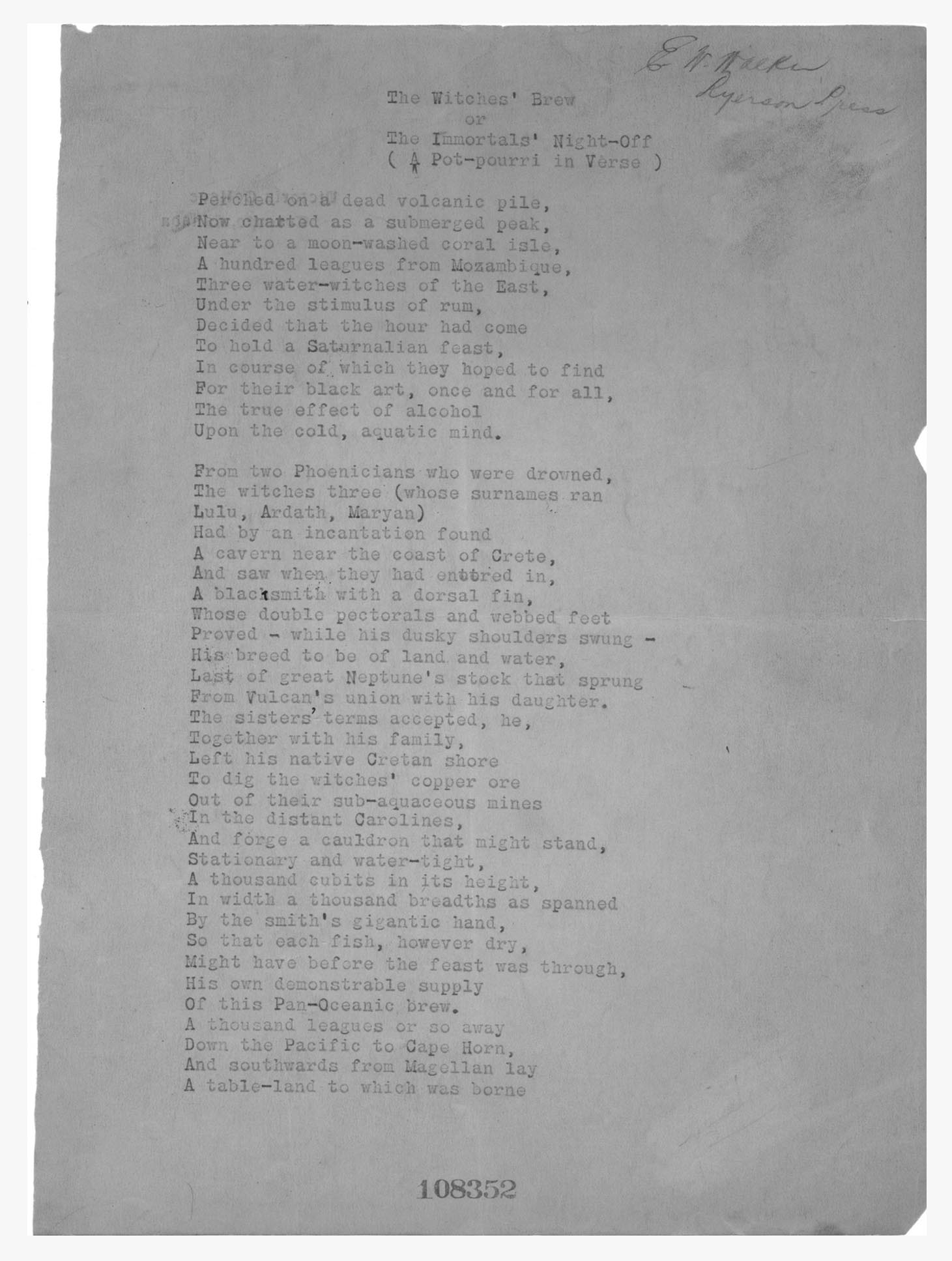 However, it was the London firm of Selwyn and Blount that, in 1925, published the first edition of this narrative long poem, with decorations by British artist and book illustrator John Austen. The London publication was the result of a trip that Pratt made to Britain in hopes of international recognition that did not materialise. The Macmillan of Canada edition was published the following year. Pratt’s move from Ryerson to Macmillan was due to the subject matter of the poem.
However, it was the London firm of Selwyn and Blount that, in 1925, published the first edition of this narrative long poem, with decorations by British artist and book illustrator John Austen. The London publication was the result of a trip that Pratt made to Britain in hopes of international recognition that did not materialise. The Macmillan of Canada edition was published the following year. Pratt’s move from Ryerson to Macmillan was due to the subject matter of the poem.
A dramatic departure from Pratt’s Newfoundland Verse poems and an anomaly of his oeuvre, The Witches’ Brew is a rollicking, 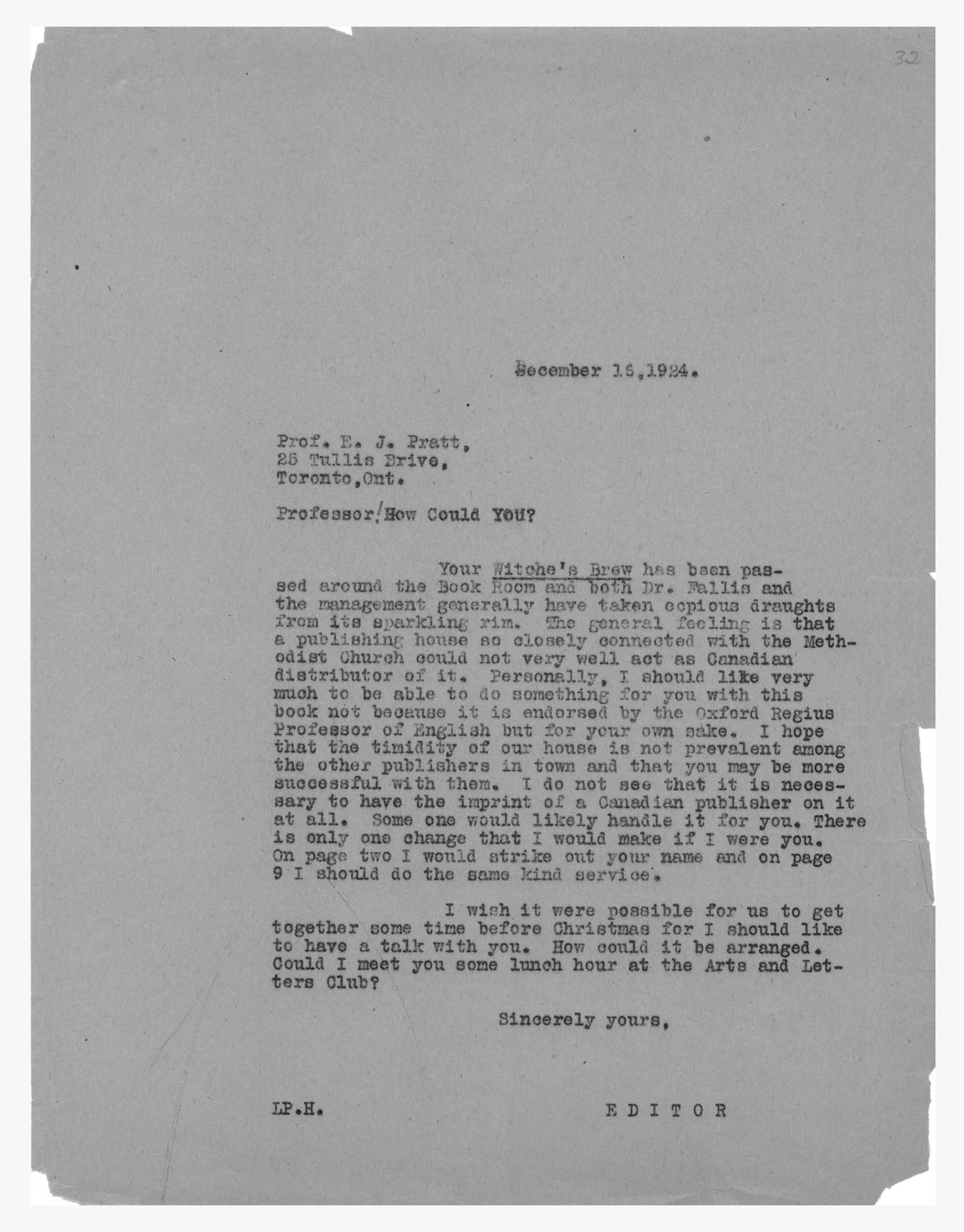 fantastical comedy that concerns a drinking binge indulged in by fish. In a letter that began: “Professor! How Could You?” Pierce told Pratt that, for Ryerson, which had been founded as a Methodist Church press, the poem was inappropriate. Although Pierce delivered the rejection in the spirit of camaraderie, saying that those at Ryerson had “taken copious draughts from its sparkling rim,” Pratt’s biographer, David G. Pitt, concludes that, even if the poem did not in fact offend Pierce’s sensibilities, it did contradict his vision of the sort of poetry that was appropriate for Pratt, whom he felt could become a poet of national stature. Despite Pierce’s misgivings, Pratt went on to receive national recognition. With Macmillan’s 1944 publication of Collected Poems, Pierce would recall Pratt’s loss to Macmillan with a tinge of regret. Five years later, twenty-six years after Ryerson’s publication of Newfoundland Verse, and the year of Newfoundland’s entry into Confederation, Pierce and Pratt exchanged letters concerning a Ryerson anthology of
fantastical comedy that concerns a drinking binge indulged in by fish. In a letter that began: “Professor! How Could You?” Pierce told Pratt that, for Ryerson, which had been founded as a Methodist Church press, the poem was inappropriate. Although Pierce delivered the rejection in the spirit of camaraderie, saying that those at Ryerson had “taken copious draughts from its sparkling rim,” Pratt’s biographer, David G. Pitt, concludes that, even if the poem did not in fact offend Pierce’s sensibilities, it did contradict his vision of the sort of poetry that was appropriate for Pratt, whom he felt could become a poet of national stature. Despite Pierce’s misgivings, Pratt went on to receive national recognition. With Macmillan’s 1944 publication of Collected Poems, Pierce would recall Pratt’s loss to Macmillan with a tinge of regret. Five years later, twenty-six years after Ryerson’s publication of Newfoundland Verse, and the year of Newfoundland’s entry into Confederation, Pierce and Pratt exchanged letters concerning a Ryerson anthology of 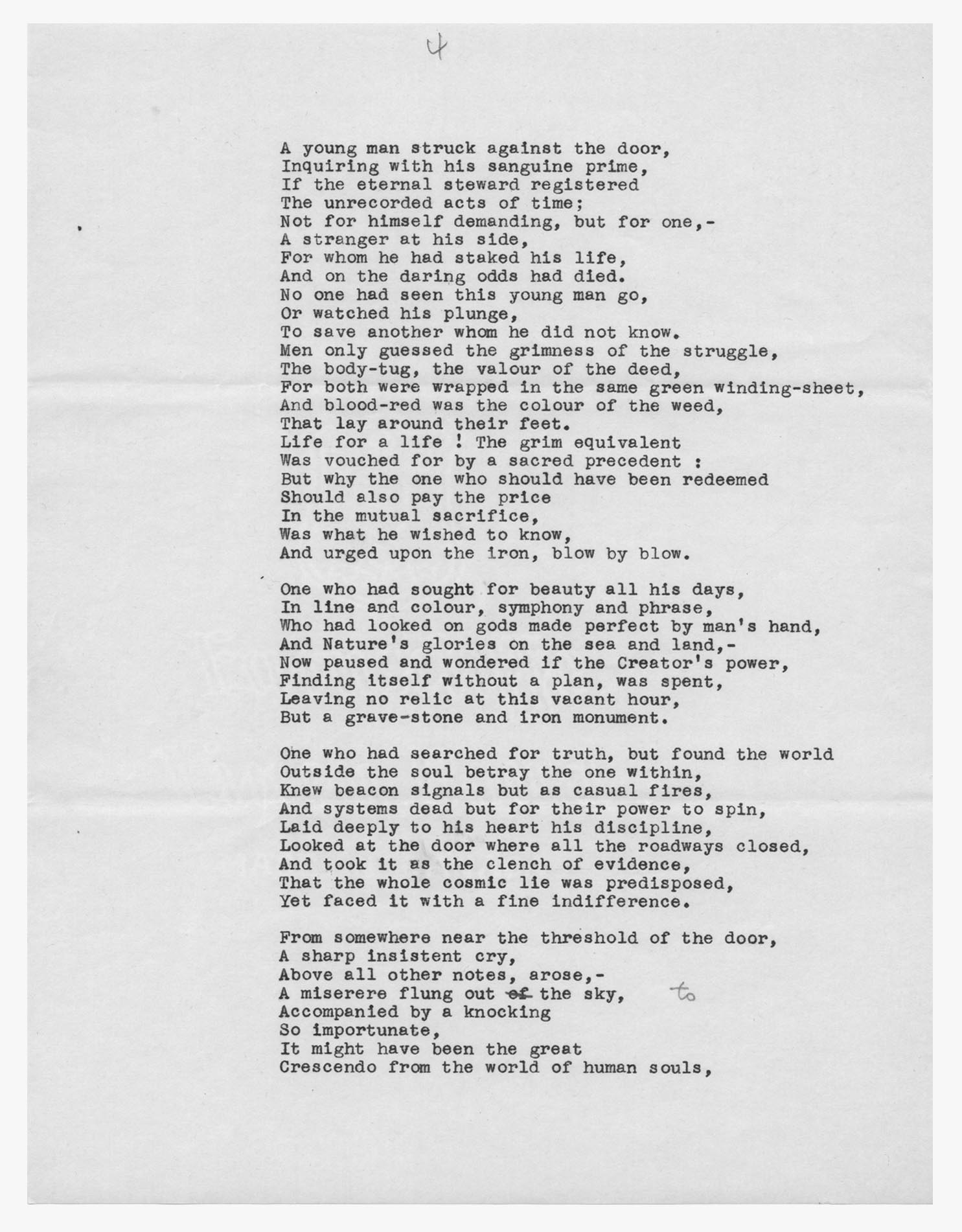 Canadian poetry in which Pierce wished to reprint “Newfoundland,” one of the poems originally collected in Newfoundland Verse. The correspondence between poet and editor shows how the professional and the personal were intertwined. For instance, although Pratt was, as mentioned, being published by Macmillan, he sent Pierce a typescript of his poem, “A Vision of An Iron Door” and, in the accompanying letter, explained: “I am sending you this poem with my deepest affection. You are responsible for the 2nd and 3rd stanzas on page 4.”
Canadian poetry in which Pierce wished to reprint “Newfoundland,” one of the poems originally collected in Newfoundland Verse. The correspondence between poet and editor shows how the professional and the personal were intertwined. For instance, although Pratt was, as mentioned, being published by Macmillan, he sent Pierce a typescript of his poem, “A Vision of An Iron Door” and, in the accompanying letter, explained: “I am sending you this poem with my deepest affection. You are responsible for the 2nd and 3rd stanzas on page 4.”
Laakso Raymond, Lila Laakso, Moira Allen, and Marjorie Linden. “E. J. Pratt: An Annotated Bibliography.” The Annotated Bibliography of Canada’s Major Authors, ed. Robert Lecker and Jack David, 2 : 147-220. Toronto: ECW, 1980.
Pitt, David G. E. J. Pratt: The Truant Years, 1882-1927. Toronto: University of Toronto Press, 1984.
—. E. J. Pratt: The Master Years, 1927-1964. Toronto: University of Toronto Press, 1987.
Pratt, E. J. E. J. Pratt: Selected Poems, ed. Sandra Djwa, W. J. Keith, and Zalig Pollock. Toronto: University of Toronto Press, 2000.
Lorne and Edith Pierce collection, Queen’s University Archives
Edwin John Pratt fonds, Victoria University Library Special Collections, University of Toronto
Lorne Pierce fonds, Queen’s University Archives
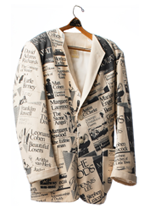
![[Cashbook], 1 May 1879 - 31 December 1887](/sites/default/files/styles/thumbnail/public/canpub/CP00990.jpg?itok=dNz5ESoz)
![[Cashbook], 1 May 1879 - 31 December 1887](/sites/default/files/styles/thumbnail/public/canpub/CP00990-002.jpg?itok=w3XE69oB)
![[Cashbook], 1 May 1879 - 31 December 1887](/sites/default/files/styles/thumbnail/public/canpub/CP00990-003.jpg?itok=TtdhNdo3)
![[Cashbook], 1 May 1879 - 31 December 1887](/sites/default/files/styles/thumbnail/public/canpub/CP00990-004.jpg?itok=7-vA_34E)
![[Cashbook], 1 May 1879 - 31 December 1887](/sites/default/files/styles/thumbnail/public/canpub/CP00990-005.jpg?itok=CwnA3_-1)
![[Cashbook], 1 May 1879 - 31 December 1887](/sites/default/files/styles/thumbnail/public/canpub/CP00990-006.jpg?itok=KXRqWAtU)
![Photograph of Yuri Rubinsky [n.d.]](/sites/default/files/styles/thumbnail/public/canpub/CP00991.jpg?itok=5s7yaQFk)
![Photo album: "A Little Souvenir of 'Green Gables' and 'Avonlea'" [n.d.] with accompanying note from Jack McClelland](/sites/default/files/styles/thumbnail/public/canpub/CP00992.jpg?itok=ish03cub)
![Photo album: "A Little Souvenir of 'Green Gables' and 'Avonlea'" [n.d.] with accompanying note from Jack McClelland](/sites/default/files/styles/thumbnail/public/canpub/CP00992-002.jpg?itok=GKbpwjs0)
![Manuscript pages from "The Blythes are Quoted" by L.M. Montgomery, [April, 1942]](/sites/default/files/styles/thumbnail/public/canpub/CP00993.jpg?itok=0z_0Tuqq)
![Manuscript pages from "The Blythes are Quoted" by L.M. Montgomery, [April, 1942]](/sites/default/files/styles/thumbnail/public/canpub/CP00993-002.jpg?itok=hU8maFaC)
![Manuscript pages from "The Blythes are Quoted" by L.M. Montgomery, [April, 1942]](/sites/default/files/styles/thumbnail/public/canpub/CP00993-003.jpg?itok=RVgyqviW)

